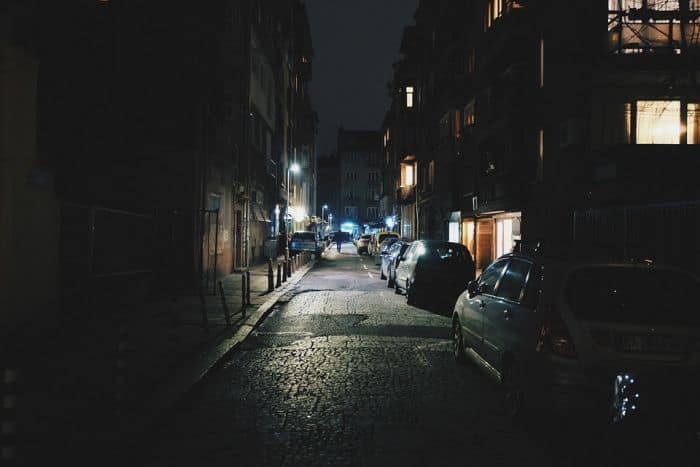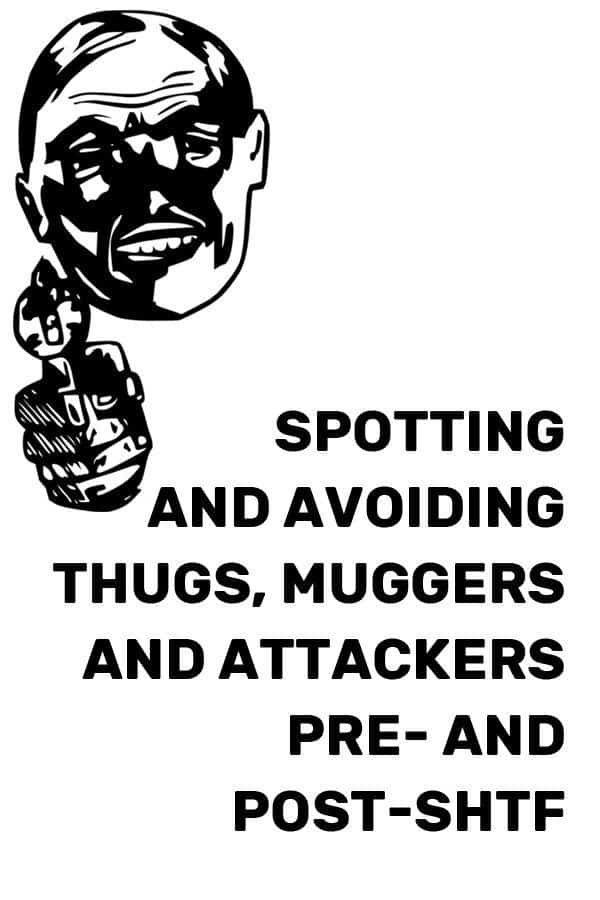Understand this: no matter where you are there are people that mean to harm you. Maybe for the sake of hurting or killing you, in order to scratch some twisted itch in their blackened hearts. More likely they will rob or kill you to take something they want. Some are simply irreconcilably evil.
They will be present before, during and after a crisis, constantly assessing their chances of success at their criminal work.
To the untrained, they move about in society unseen before they attack, the battered victims and broken bodies they leave behind both herald and calling card of their presence. To a trained observer they will be visible, even obvious.
All but the slyest will betray their intentions through tells, behavioral quirks and pre-attack indicators.
Learning what these signals are and how to interpret them against the backdrop of the environment you are in will give you a massive advantage when it comes to avoiding scumbags altogether, or if you cannot avoid them then at least give them a wide berth or prepare ahead of time to meet their attack with a counterattack of your own.
In this article we will explore techniques for detecting and avoiding potentially violent criminals in a variety of settings. With these tips and a little luck, you can deselect yourself from their targeting list of easy victims.

Understanding the Threat
Before we go any further, you must understand a fundamental truth: criminals absolutely do not care about you. Period, at all. They don’t care if you are injured, dying or dead as a result of their actions.
Your condition only matters to them so much as it will affect their outcome; perhaps it is better to kill you outright if they want what you have badly enough and fear you are capable of strong resistance, or you are the only witness to their crime.
Maybe they cut or beat you out of spite or to gain compliance. Perhaps they stop short of killing you to avoid a legal charge. It is a more or less simple calculus.
Criminals do care about punishment and injury, however. Like any predator, they look for easy prey as a rule. Hard prey may injure the predator, preventing them from hunting or even killing them. Bad move on their part.
Criminals that prey on their fellow man are ambush predators by nature. Know that a potential attacker’s perception of your awareness, specifically of your surroundings including the people in it, is a major factor in their choice to attack you or someone else. If you are distracted, spaced out or otherwise engaged you will be elevated on their list of targets.
For this reason above most others, your skill at detecting them before they attack, or you find yourself too far along in their approach, is essential.
Sure, soft skills like this are not as cool or fun to refine and practice as hard skills like shooting or combatives, but they are arguably more important. Early warning is priceless, because early warning buys you time to think and react.
Your Trump Card
Though criminals don’t care about you one lick, they certainly do care about themselves. Criminals may not have any reservations about using violence per se, but they do fear repercussions: getting caught and incarcerated or biting off more than they can chew and being maimed or killed.
This means criminals preparing to perpetrate an attack will be nervous, anxious and furtive. This troubled mindset will result in tics and behavioral cues that are detectable, and will betray their intentions.
Depending on the environment and their method of attack, you may be able to recognize positional cues that can tip off observers; things like where they are standing, what they are doing (or pretending to do) in relation to other people and moving to close with you where you are or along your path of travel. We’ll dissect and examine these tells in detail in the following sections.
All but the coldest or most professional scumbags will broadcast their intentions through these tells. Learning to spot them reliably is your single best tool for avoiding harm.
Above all Things, Trust your Instincts
Your gut, intuition, sixth sense, whatever you want to call it will rarely, if ever betray you when it comes to your personal safety. If it looks wrong and feels wrong, it is wrong. Your instinct is more than merely an unquiet mind or anxiousness: it is peripheral logic that has alerted to something your forebrain has missed.
Every human being, even the most blissfully unaware hippie, possesses this raw and primal early warning system if they will only tap into and listen to it. It is not paranoia, nervousness, bigotry or anything else, it is only a heightened sense of what could be.
The takeaway is you should act on it when you feel that flutter in your gut or tickling in the back of your head. I’m not saying you should wind up and tee off on or shoot anyone without proper legal justification, but you should do something to improve your position, thwart any possible advantage this potential attacker may have on you or at the very least do something to confirm your suspicions.
If you have a bad feeling about the person tailing you down the street, cross the road, and then perhaps reverse direction. If they mirror you, you have a problem. Prepare to deal with it. Hopefully you won’t forget to take your EDC items with you that day.
Similarly if someone leaves their position on an intercept trajectory with you, and they have no discernible excuse why they may closing on your path, take action.
Double back, or hold your position and look them in the eye. A normal person may break eye-contact, but will continue on their way. A furtive attacker will shunt their gaze or abruptly change course to cover their aborted approach.
You may wind up doing something that is mildly to severely socially embarrassing to err on the side of caution, but, if you are wrong, that is a far better outcome than allowing someone to get way too close because you did not want to make a fuss. Don’t let niceties and social norms march you to your doom.
Tips, Tells, Signs and Signals
Below is a guide to major signals, procedures and checks you should be alert to when assessing people in your environment both pre- and post-SHTF.
Constant Relaxed Alertness
Your brain is your first weapon when it comes to your safety, and your attention is finite. I cannot emphasize enough how critical it is to maintain relaxed alertness and awareness of your environment.
As I mentioned above, your lack of awareness or preoccupation with some other task is a major factor in your selection as a victim.
We have all been chided to keep our heads up and out of phones, books and other things, and to keep earbuds and headphones off our ears. I know I have said it (and heard it) till I am blue in the face but it is great advice.
Let me let you in on a little secret though, one you will not hear often from those in the sector of self-defense and personal security: there will always, always be gaps in your attention.
Let’s get real: assuming you are reading this on your computer or other device, you live a more or less normal, safe and prosperous life.
Considering you have to do hundreds of mundane things in pursuit of your daily tasks and errands that require your attention, there will always be gaps that can be exploited by someone willing to put it to you.
It could be loading the car with groceries, answering an important call you are waiting for or just trying to figure out where you are going. Any of them may furnish a bad guy with opportunity to close with and surprise you.
This is not intended to make you paranoid, instead it should reinforce the need to be aware of who is around you before you switch your focus to something you need to do.
Excuse for Presence and Excuse for Action
When assessing people in your environment, really take note of what they are doing, where their attention is and what reason they have to plausibly be there.
Why is someone loitering in the middle of a parking lot? Why are they not entering the building or a vehicle? Why would someone following you stop when you turn to look at them? Why would they not keep walking?
Let’s say a group of young men behind you in line at the checkout walk out behind you hot on your heels, far too quickly to have purchased anything and cashed out. Did they also park where you did in the lot? Expect trouble, and a lot of it.
Where is someone directing their attention? Do you notice someone noticing you too intently, or too often? That’s a clue. If there is no reasonable excuse for someone’s actions or presence, pay attention to them.
Furtive Movement
Humans that are amped up because they are about to attack another human being often exhibit many curious gestures. “Grooming” displays, of touching, wiping or rubbing the neck, chin and face are common. Exaggerated or jerky movements of the hands are rehearsals for a draw or strike.
Look for rapidly increasing strides, glancing or looking around while closing with you (to check for witnesses or reinforcements) and taps or pats near the waistline, a “feelie” to confirm to the carrier their weapon is still in place.
Be Cautious of Anyone Flagging Your Down or Entering Your Personal Space
Beware anyone who approaches you with a question, request or plea for help. Especially in the aftermath of a disaster! Sadly, the classic broken-bird play is often a reliable prelude for an attacker to close the gap effortlessly while fixing a victim in place. You must be especially alert to this after dark or anytime you are isolated or alone! A common variation is a coordinated effort by 2 or more scumbags; one is the distraction, the other accosts you while your focus is on their buddy the actor.
Instead, tell someone flagging you down to hold up where they are and keep their distance. You can make up an acceptable social excuse or not. If you do, it might be something like you have anxiety, are claustrophobic or have a wickedly contagious case of brain-tooth. Whatever. Anyone who does not comply or tries to subtly close with you once rebuffed probably has no good intent.
Yes, even stopping someone 10 or more feet out means they can close with you almost instantly. Yes, you will doubtlessly appear awkward or even offensive using this technique. So be it. To the first, having some standoff is far preferable to no standoff; increasing your reaction gap is always to your benefit. Second, you can be creative or not when it comes to backing people off to ease the interaction if you are so worried about it. I am not. I can be charitable in other ways and have enough friends, so I feel no need to deal equitably with strangers in public.
Watch their Hands!
The eyes are indeed the windows to the soul, but the hands are what will kill you. Anyone who is approaching you, waiting for or blocking your approach or inside your bubble with their hands hidden from view in a pocket or bag, behind their body or behind an obstruction demands immediate attention. A hidden hand could produce a weapon before you can react.
Obviously anyone with a weapon (improvised or otherwise) in their hand demands total attention and a swift response.
Read the Temperature of a Room/Crowd before Entering
Pay attention to other people around you for clues as to what might be happening before you enter a space. Just this week I heard a story about a young woman who was nearly waylaid in a bank robbery because she was zoned-out with head down and earbuds in standing in line for the tellers. Other patrons even tried to warn her, to no avail!
Take a page from this example and pause for a moment to observe building interiors either through windows or at the door before entering. Are the people inside behaving normally? Do they seem distressed? Is anything going obviously wrong like, for instance, a guy is waving a gun or knife around?
It is easier than you think to blunder into a bad situation by taking things for granted. Normalcy bias is real, and will get you into a situation you may not be able to talk your way out of.
Similarly, take care around large crowds. Any crowd of people that are hyped-up and of similar mind may quickly turn into a mob. Mobs are unpredictable and dangerous, so you don’t want to be there if things touch off. If the vibe of a crowd is trending toward agitation, get distance immediately.
Avoid Known Bad Areas and Groups
You’ve been hearing this since you were small. In any place there will always be rough places. Usually low income housing, rowdy hangouts of troublemakers and malcontents, or locations known for violence or drugs. Avoid these places unless you have no other choice.
The denizens of such areas will usually be keenly aware you do not belong, and you’ll stick out like a neon sign. You can ill-afford that kind of attention in kind times, and it will be far more consequential after SHTF when you may have absolutely no one to call for aid or rescue.
If you are traveling or find yourself in an unknown area, pay close attention to where you are going.
If you notice the quality of the buildings and neighborhoods around you decaying (vacant and boarded up buildings, lack of high-end commercial, preponderance of pawn shops and check-cashing business, overt security features like barred windows, gates, fences topped with barb or razor wire, etc.) turn around and find another way. Be ultra-vigilant if entering an area like that on foot.
Conclusion
Humans have threatened other humans since before history was, and while robberies, and muggings seem to come out of nowhere without warning, nothing could be further from the truth.
Criminals use a selection process to target high-chance-of-success victims, and knowing what signs and tells indicate they are operating in the area, or even selecting you, will do much to prevent an attack completely.


Charles Yor is an advocate of low-profile preparation, readiness as a virtue and avoiding trouble before it starts. He has enjoyed a long career in personal security implementation throughout the lower 48 of the United States.

Or go live in Chicago for seven years, as I did long ago. For those born in the city, this stuff is almost instinctual. For somebody from Des Moines, Iowa, it was all Greek. But thanks to friends, I came out OK. although I did have to threaten a life a couple times. So what? Just street animals that I would have put down, but they made the best choice and walked away, sniveling about this and that.